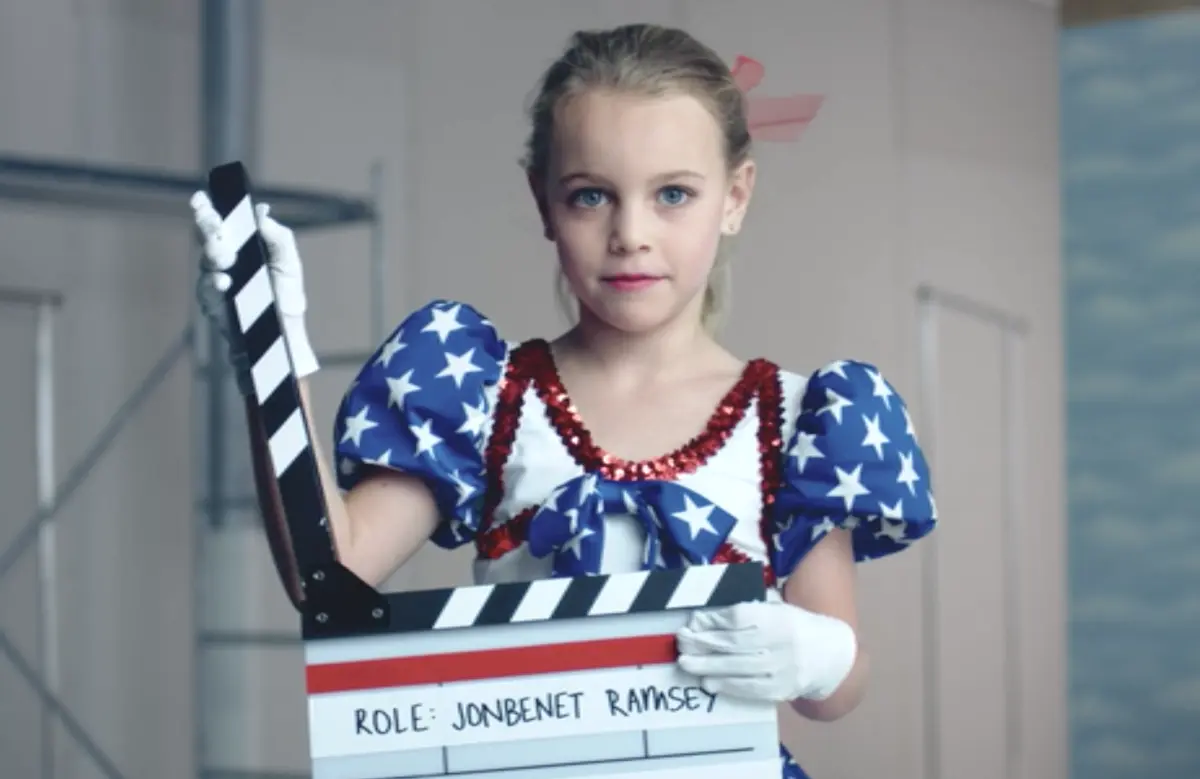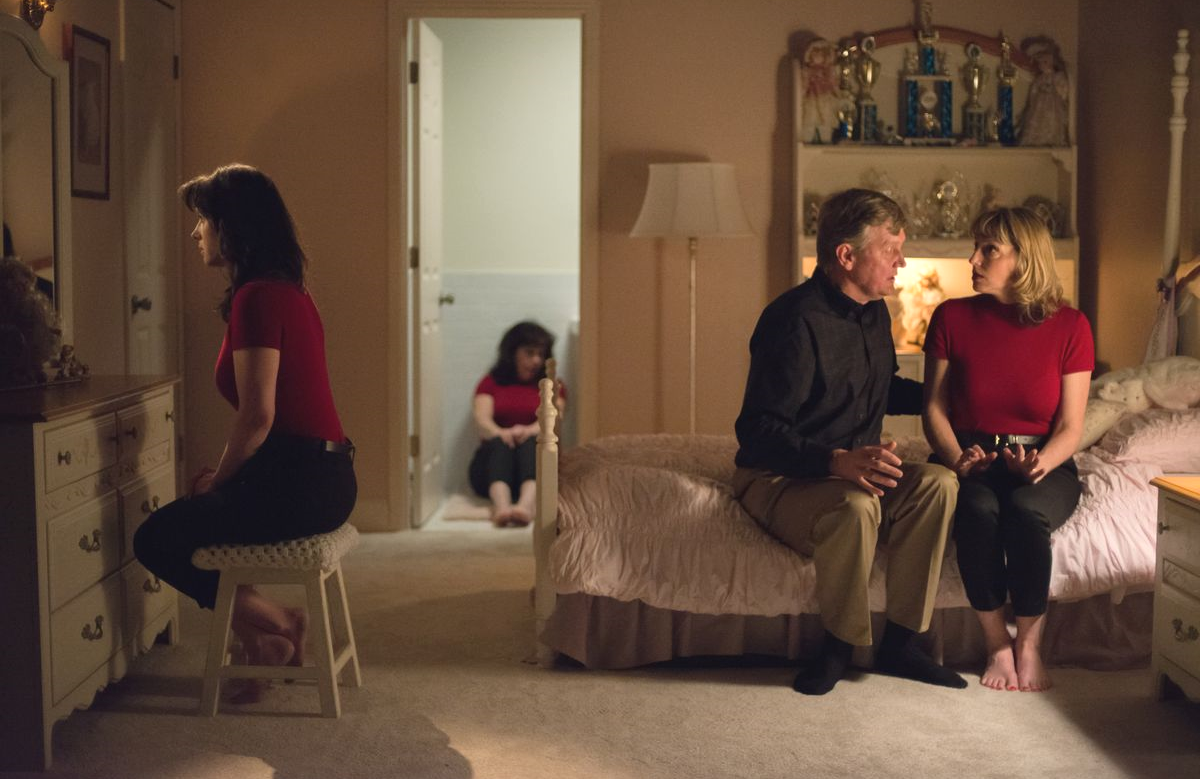Do You Believe John Ramsey? Casting JonBenet Won’t Change Your Mind
-
 An image from the Netflix film Casting JonBenet (Photo: Netflix)
An image from the Netflix film Casting JonBenet (Photo: Netflix)Casting Jon Benet
2017
Watch on NetflixIn 1996 the world was years away from Facebook and Twitter, and the Internet was ruled by Prodigy and AOL. The go-to news source was CNN, though it had trouble sustaining an audience in the long gaps between breaking-news events. That’s right — there was a time in America when BREAKING NEWS wasn’t a red banner affixed permanently to the TV screen. Journalism was cyclical; we lived in a world of morning papers and nightly news.
But on December 26, 1996, that all started to change. That morning the Boulder, Colorado, police took a frantic 911 call from Patsy Ramsey, who was babbling about a ransom note and her missing six-year-old daughter JonBenet.
The cops seemed to be caught off guard by the call. The only person on the force trained to handle kidnapping cases was on vacation. Detectives failed to secure the crime scene, and in fact no one from the Boulder PD even searched the house until hours later, when JonBenet’s father John Ramsey found the girl’s body.
Standing in the contaminated crime scene, police quickly made John and Patsy their persons of interest. Signs of forced entry would be discovered later on. Indeed, an intruder broke into another family’s home not far from the Ramseys. Had this evidence been taken seriously, it would have steered the investigation away from JonBenet’s parents.
But it wasn’t. Within days the little beauty pageant queen had become a runaway news story unlike any other, and a new era of nonstop news and reaction had dawned.
The first question you may have about Casting JonBenet, the remarkable concept film from Australian director Kitty Green, is why? Why does the world need another TV film about a very old murder case that even those who followed it obsessively at the time now barely remember? What possible light could be shed after all the news coverage, cut-and-paste cable shows, high-profile books, and at least six TV miniseries?
That’s easy: No light is shed on the murder case at all. Because that’s not what Casting JonBenet is about. This is a film about narrative and polarization and “alternative facts,” and that’s what makes it so incredibly relevant to our own time.
Casting JonBenet is a living museum of America at the dawn of a new information age, before social media and the outrage industry took over. It’s about people’s need to believe stories that are demonstrably false. It’s about a free society with access to more high-quality information than anyone in human history, and just as high a capacity for self-delusion.
One thing’s for sure, it’s unique.

Parts of Casting JonBenet are scenes from a made-for-TV movie. Parts of it are auditions for local actors wanting to be in that made-for-TV movie. Parts of it are reality show-style confessional interviews. The viewer is expected to sort it all out.
It’s all part of an experiment Green wanted to conduct into what she called “the legacy and mythology surrounding the case, the cultural obsession.” Her idea was to go to Boulder and Denver and hold an open casting call for the roles of John, Patsy, and JonBenet Ramsey, plus other characters one would expect to see in a “based on a true story” TV movie. Her team also reached out to area pageant moms and people in law enforcement — non-actors that Green thought would still have strong memories of the Ramsey case 20 years later.
Green sat down with each actor and explained that their audition tapes and interviews with her might be used in the film. That several actors would be cast in the same role and would occasionally appear in the same shot together. In short, whatever TV movie they thought they were signing up for, this wasn’t it.
Yet in the end, 72 actors agreed to form this repertory company of Johns, Patsys, and JonBenets. “We were like, ‘Are you willing to jump down the rabbit hole with us?’,” Green said later. “They had to trust us.”
This weird artifice rather brilliantly melds two different types of narrative: the kind that screenwriters do for TV and film, and the kind that each of us does in our head. And it makes the case that the stories we tell ourselves are far more powerful — indeed, what stories we choose to be told are determined by our internal narratives.
The actual TV-movie scenes in Casting JonBenet are utterly forgettable. They are designed to be forgettable, when compared with the jaw-dropping unscripted revelations by the actors, each of whom has a deep personal investment in the Ramsey story, specifically their version of the story.
“You’d ask them about the character and how they would approach playing Patsy Ramsey,” said Green. “And immediately one would go on about how her mother had bipolar disorder.” A different actor talked about being sexually propositioned as a 15-year-old by a “nice, sweet, older” neighbor. An actor auditioning as John Ramsey shared the time he woke up to find his girlfriend had died next to him in the night.
“It was weird how natural that was,” Green observed. “People immediately went to their own personal narratives in order to come up with some sort of way through this tragedy.”

And with disturbing frequency, people used their own narratives to convict Patsy Ramsey in the murder of JonBenet. One actor concludes that Patsy must have been “a royal bitch of a mother.” Another, citing a tearful TV interview that Patsy gave to Barbara Walters, declares that the interview was “the poorest acting job I’ve ever seen.”
We hear an actor (who claims to be a counselor) observing that Patsy Ramsey died of ovarian cancer in 2006 and that “often with disease comes dis-ease.” This bit of New Age nonsense is doubly ignorant since it disregards Patsy’s successful battle with advanced cancer in the early 1990s.
Casting JonBenet is an unsettling example of what happens when people are invested emotionally in one outcome and won’t be convinced otherwise. Just seeing a six-year-old girl dolled up to look like a post-pubescent woman was enough evidence for many to convict her parents of her murder. In 1999, three years later, a Gallup poll of people who said they were still closely following the case found that half of them believed an intruder had killed JonBenet, and half believed one or more of the Ramseys had.
Eventually, all charges would be dropped and the justice system would issue a public apology to the family. But that didn’t happen until 2008, almost twelve years after JonBenet’s murder. In the meantime, storytellers had free rein to incorporate these “alternative facts” into their narratives, even as reputable sources discredited them. Some — let’s call them the facts-and-logic group — were eventually convinced that the Ramseys did not murder their beloved child. The rest were firmly in the “lock ’em up” camp.
And so, with all due respect to you fans of The Leftovers, that is why Casting JonBenet was the most 2017 show of 2017. Twenty years before the Russians used Facebook to divide America into partisan camps, the Boulder police’s slow response, and the media’s rush to judgment, created a similar effect around a little girl who just liked to play dress-up. Whatever evolutionary instinct drives us to divide into tribal identities, even over distant crime cases, one election isn’t going to cure it.
Aaron Barnhart has written about television since 1994, including 15 years as TV critic for the Kansas City Star.
TOPICS: JonBenet Ramsey, Netflix